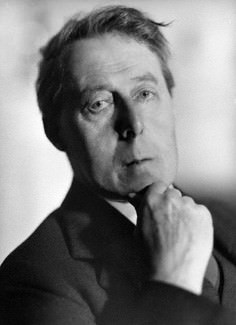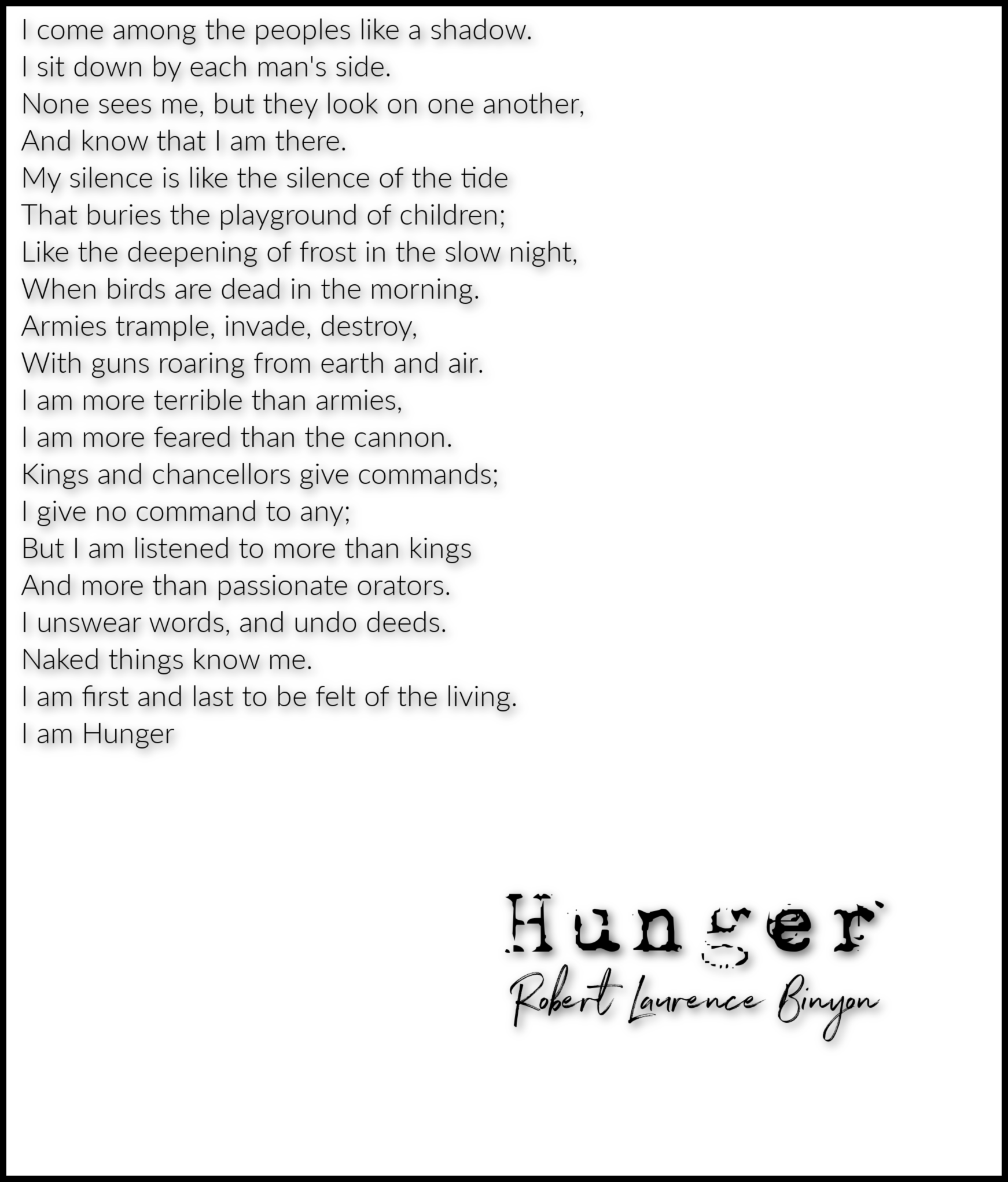
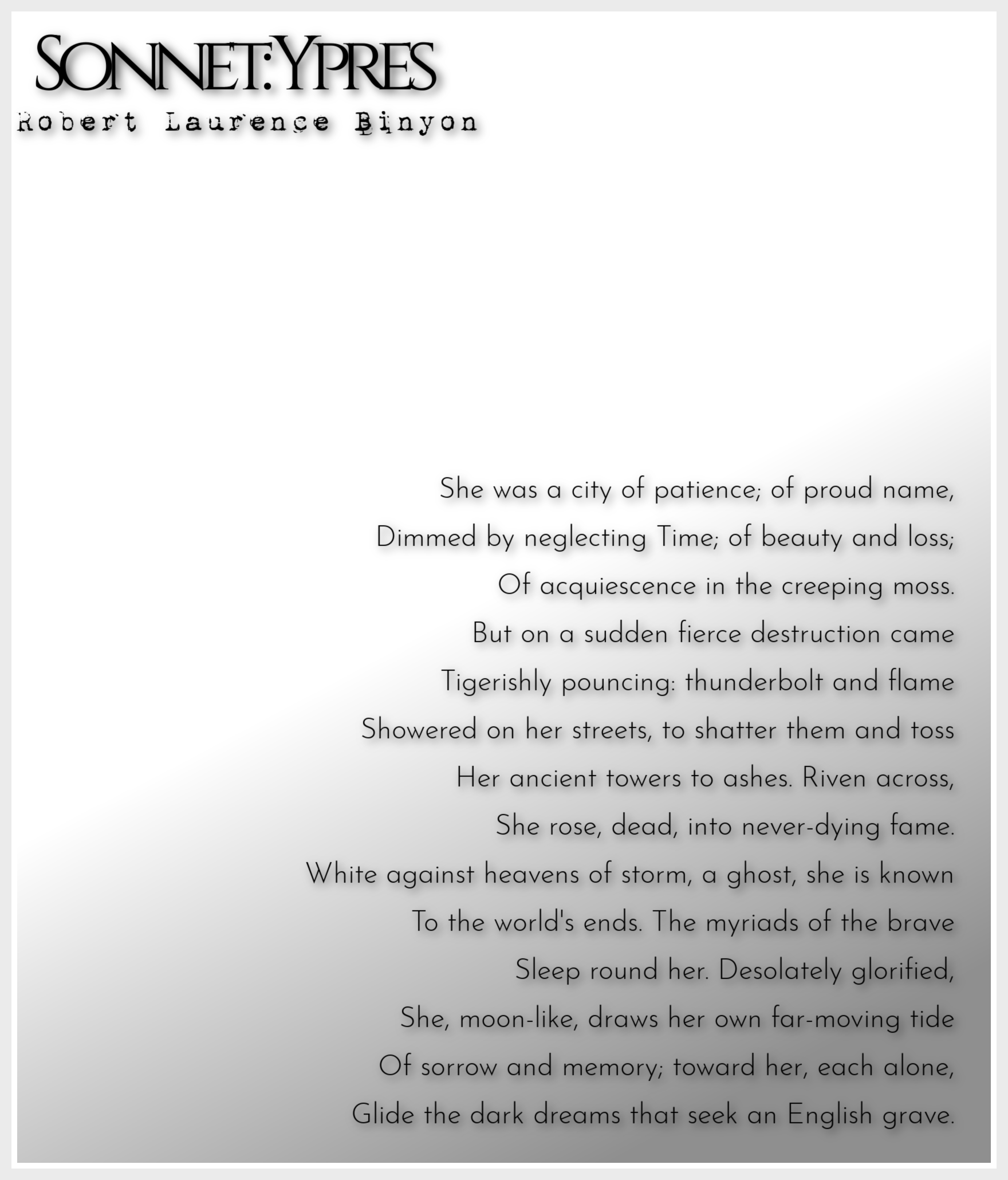
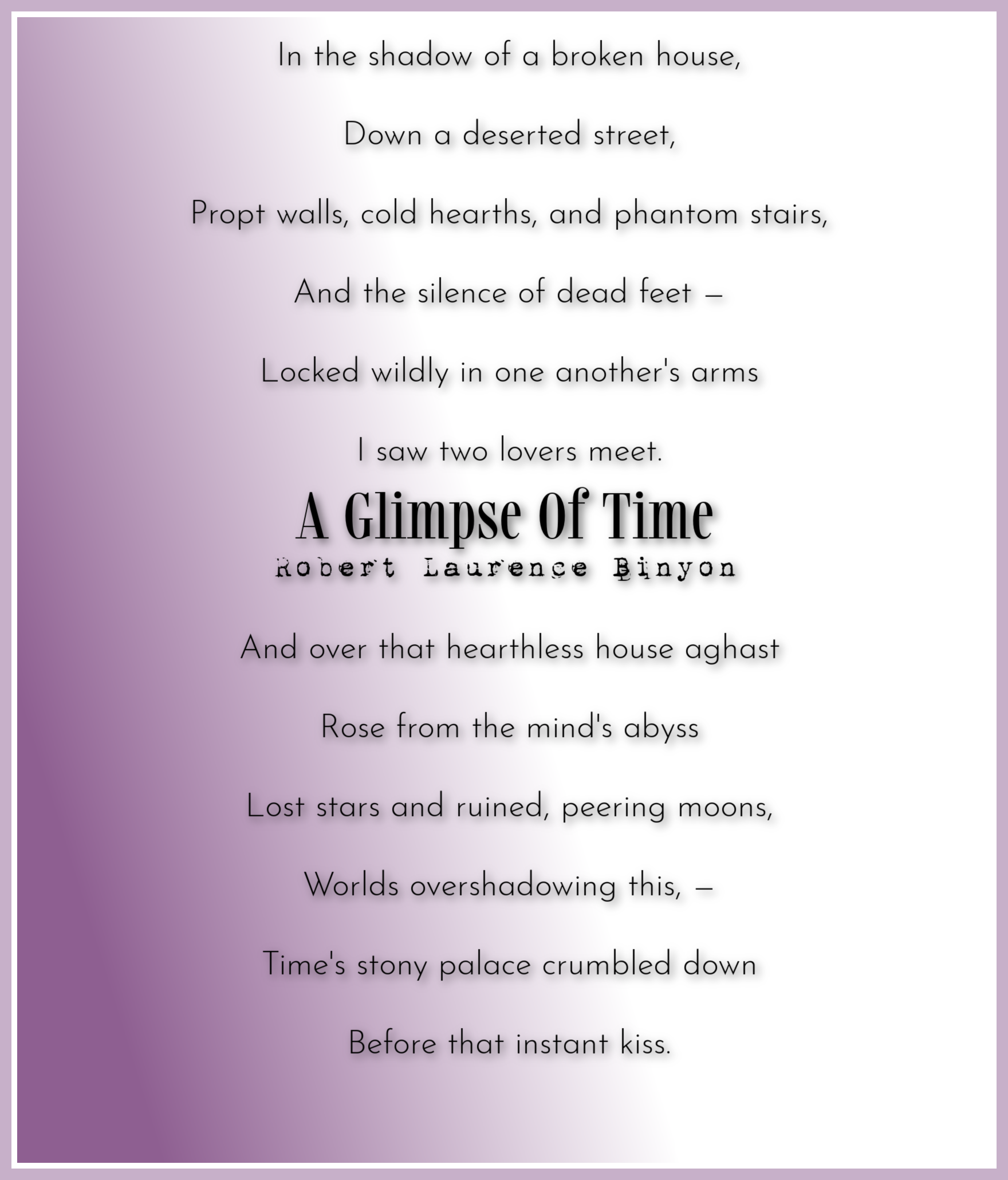
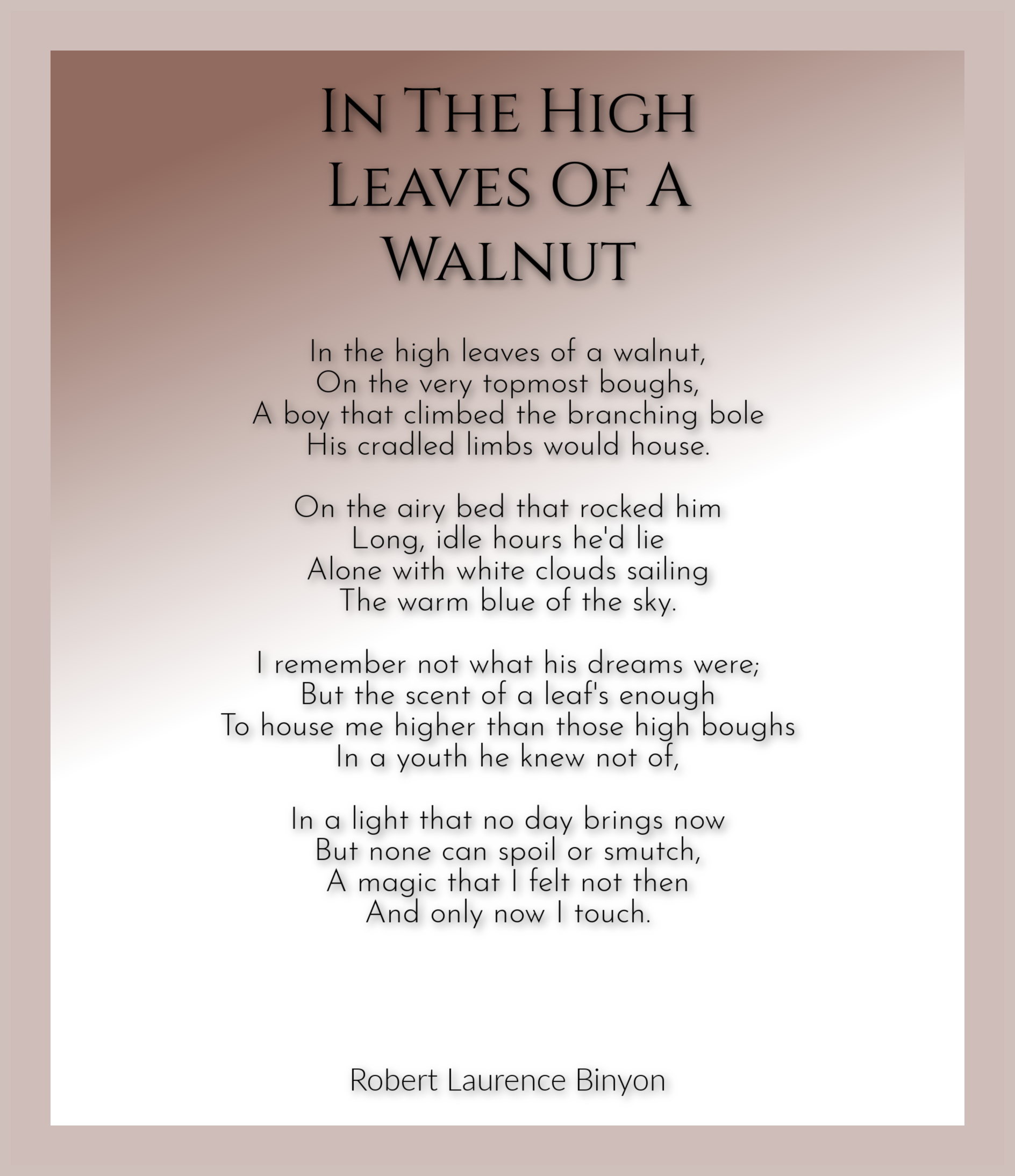
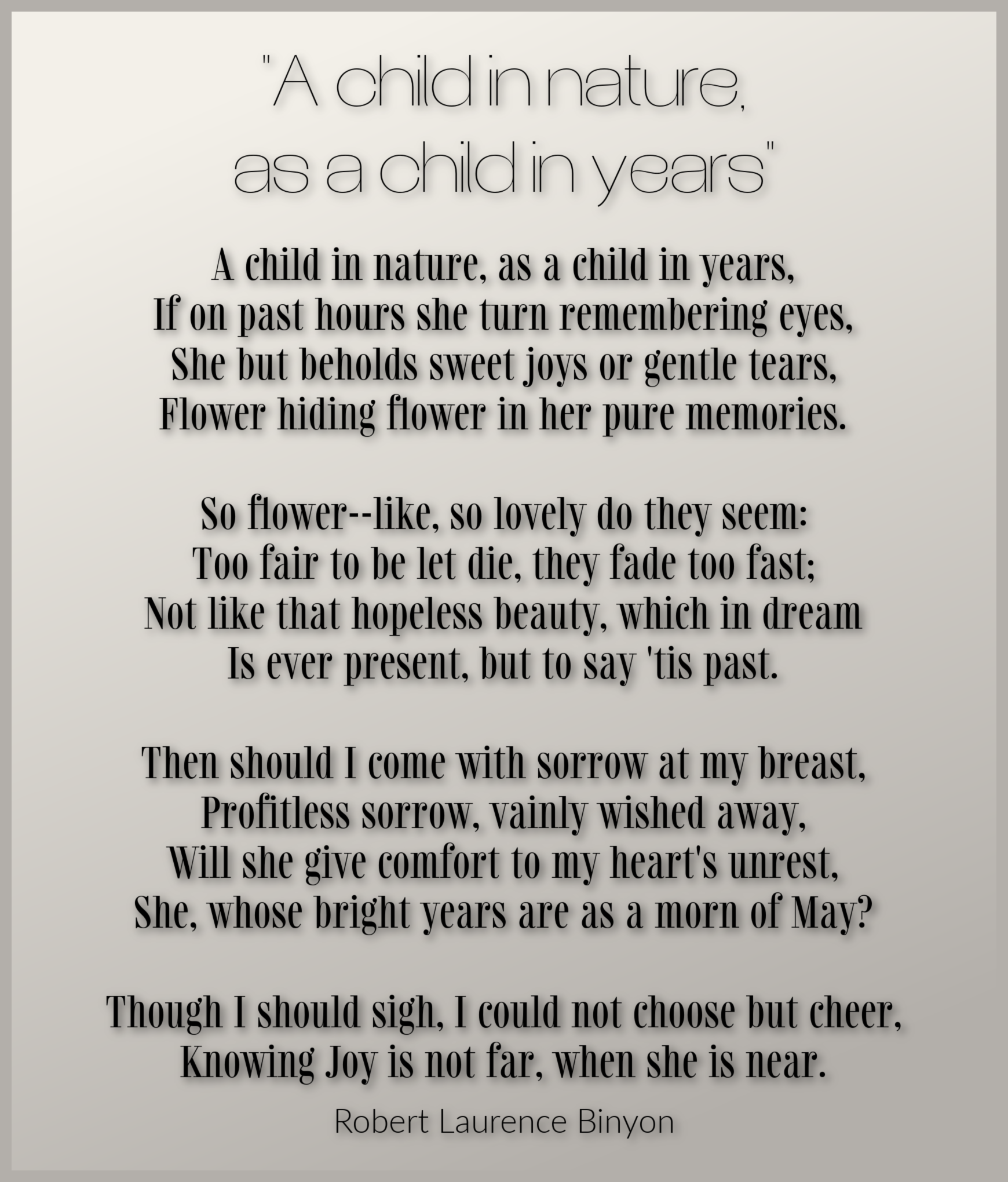
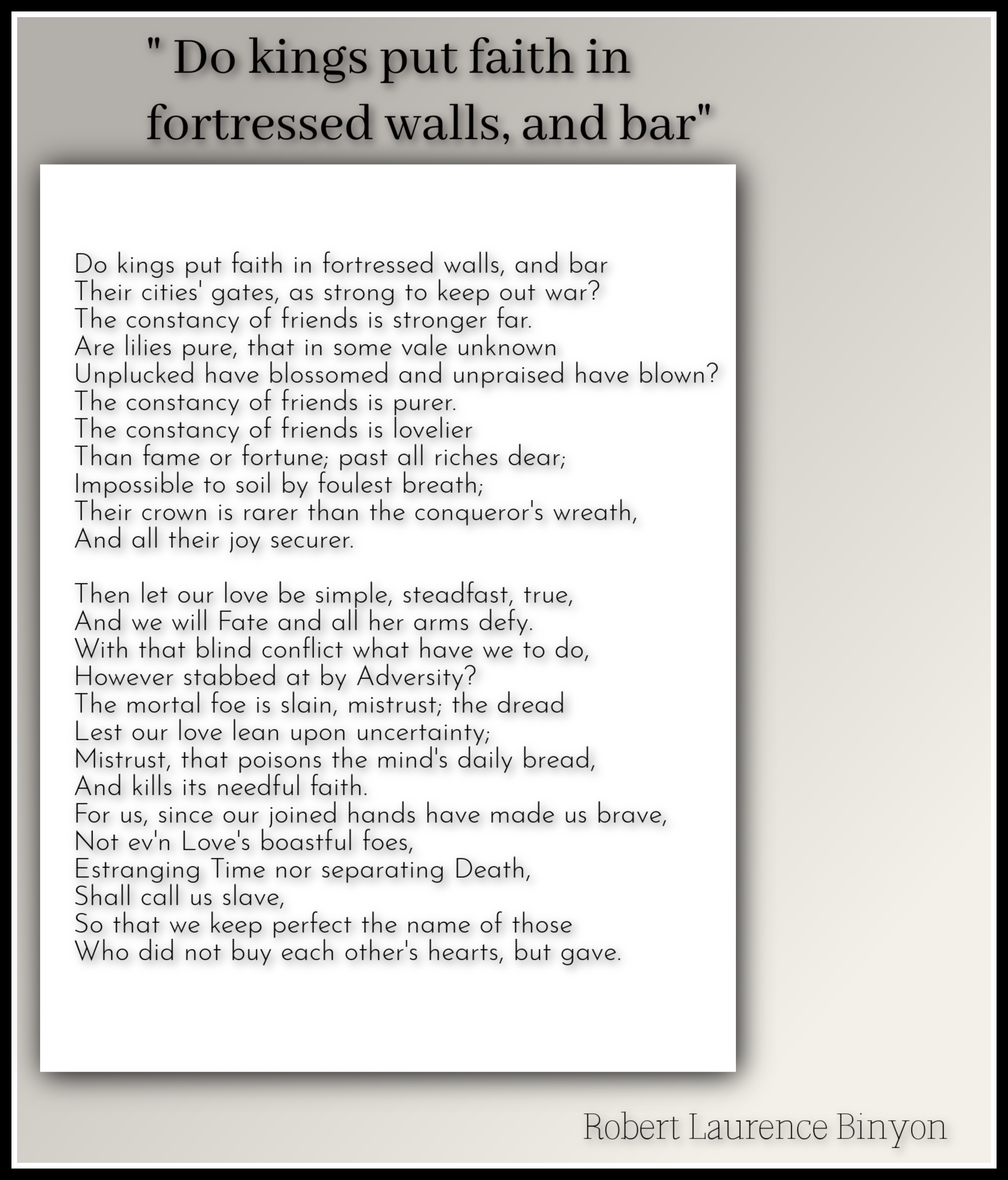
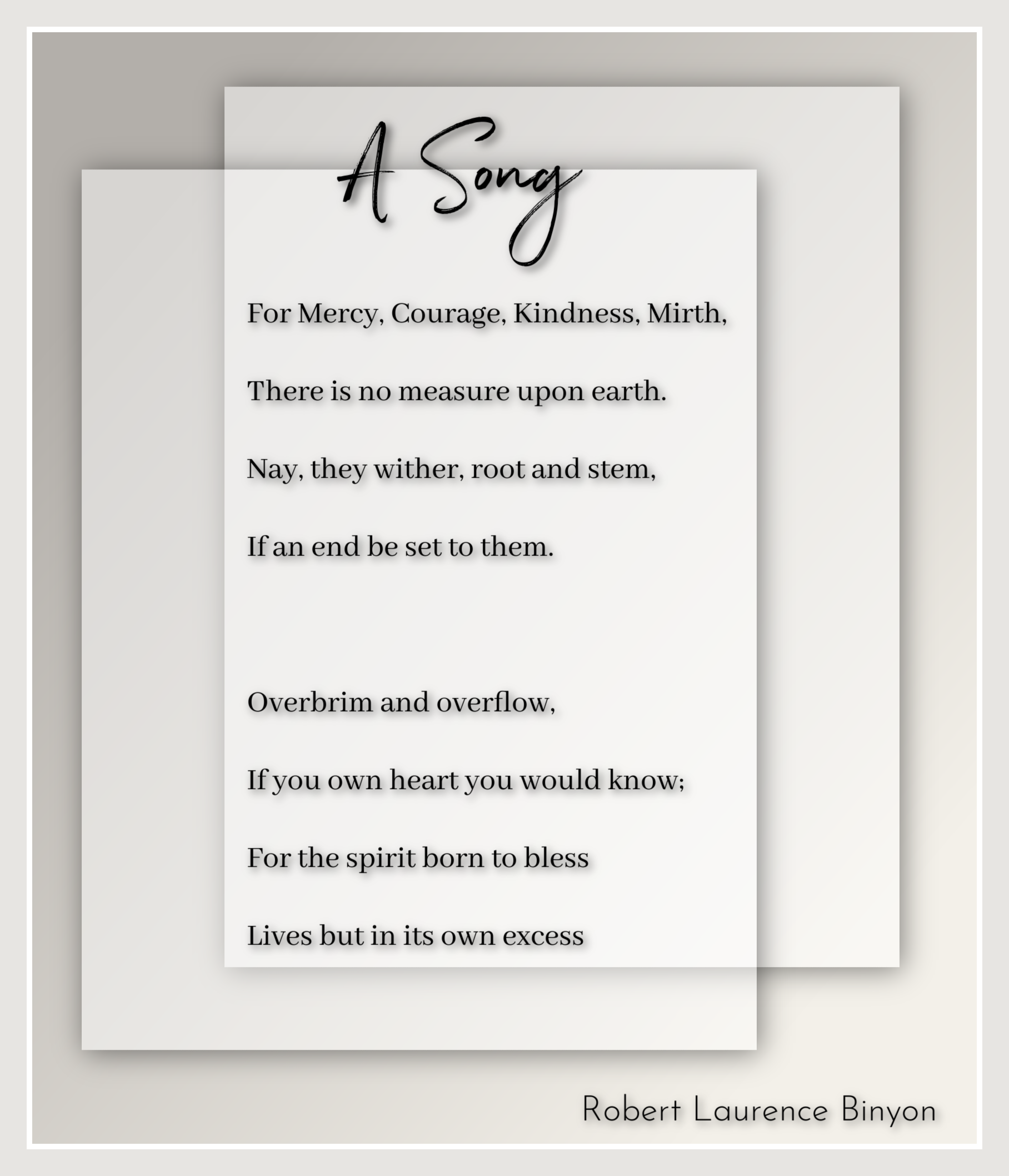
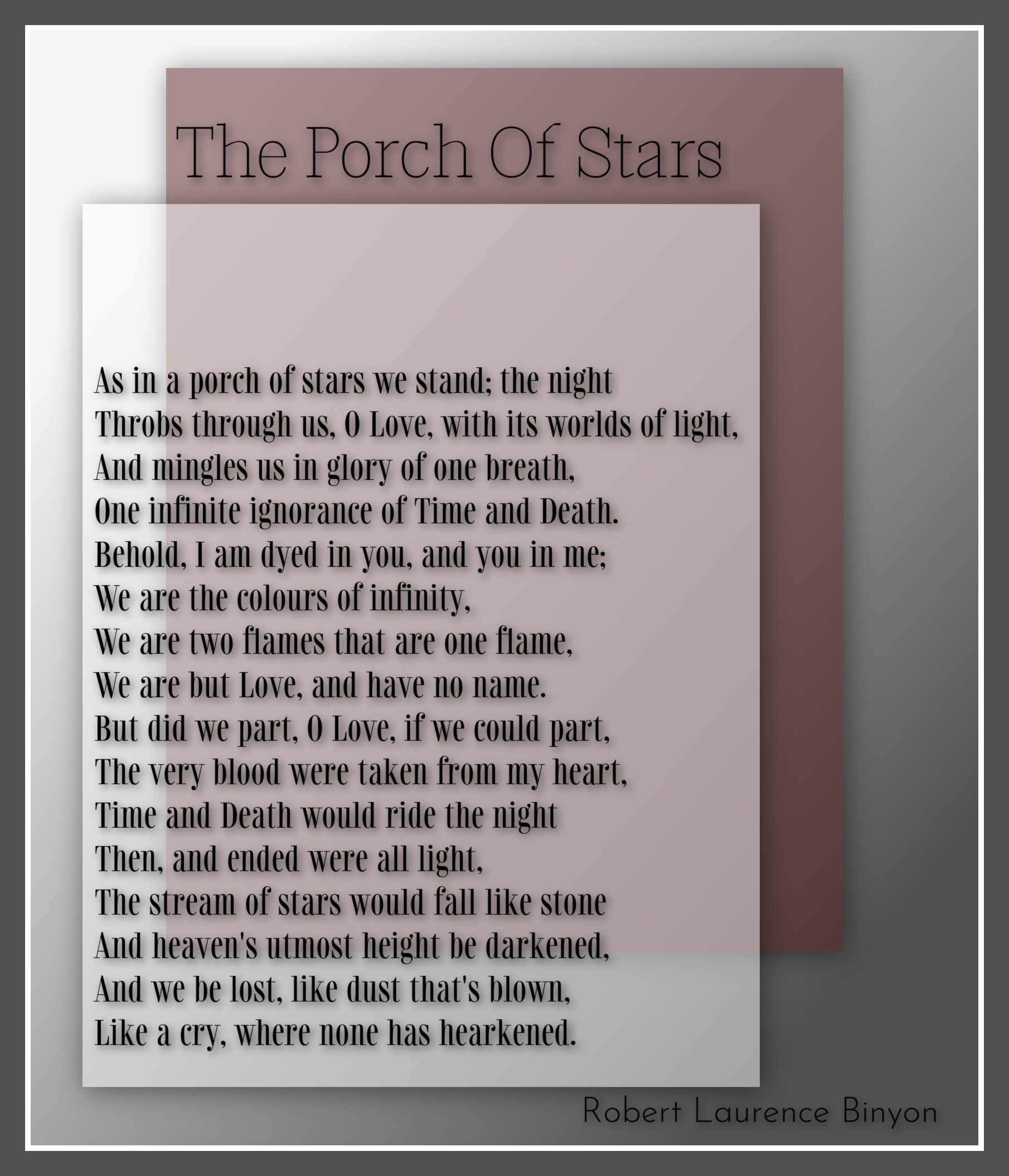
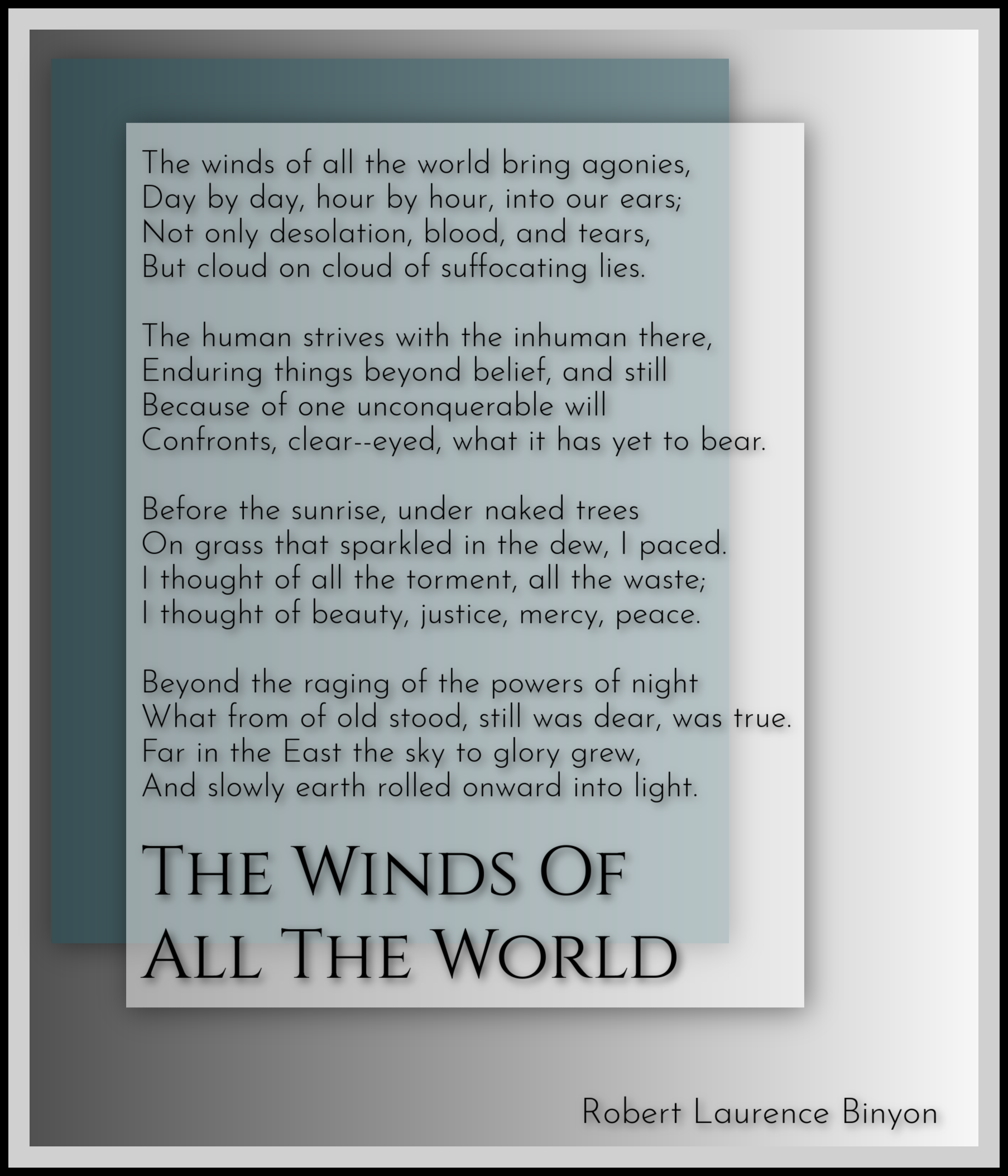
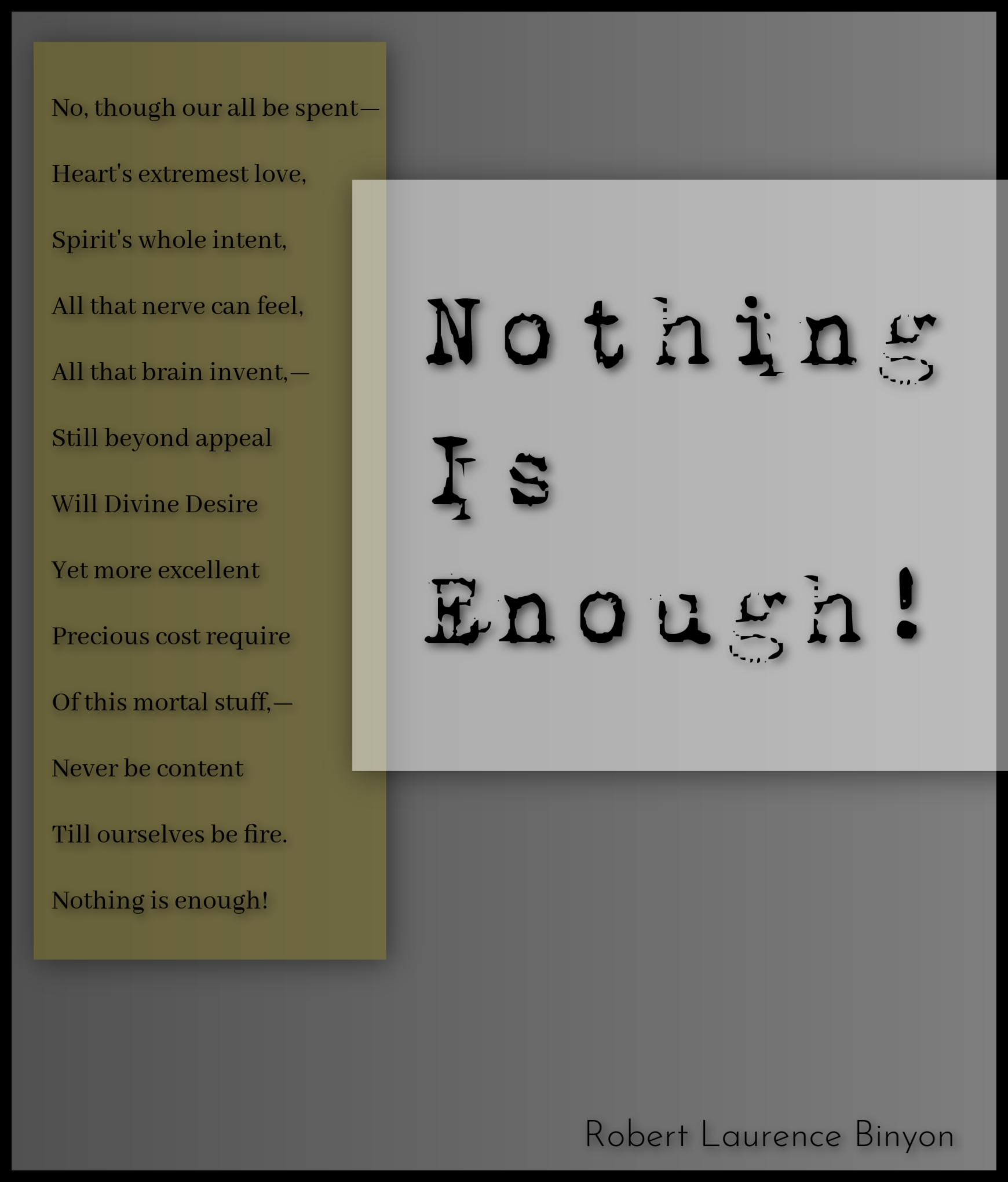
For The Fallen
With proud thanksgiving, a mother for her children,
England mourns for her dead across the sea.
Flesh of her flesh they were, spirit of her spirit,
Fallen in the cause of the free.
Solemn the drums thrill; Death august and royal
Sings sorrow up into immortal spheres,
There is music in the midst of desolation
And a glory that shines upon our tears.
They went with songs to the battle, they were young,
Straight of limb, true of eye, steady and aglow.
They were staunch to the end against odds uncounted;
They fell with their faces to the foe.
They shall grow not old, as we that are left grow old:
Age shall not weary them, nor the years condemn.
At the going down of the sun and in the morning
We will remember them.
They mingle not with their laughing comrades again;
They sit no more at familiar tables of home;
They have no lot in our labour of the day-time;
They sleep beyond England's foam.
But where our desires are and our hopes profound,
Felt as a well-spring that is hidden from sight,
To the innermost heart of their own land they are known
As the stars are known to the Night;
As the stars that shall be bright when we are dust,
Moving in marches upon the heavenly plain;
As the stars that are starry in the time of our darkness,
To the end, to the end, they remain.
The Fourth Of August
Now in thy splendour go before us.
Spirit of England, ardent-eyed,
Enkindle this dear earth that bore us
In the hour of peril purified.
The cares we hugged drop out of vision,
Our hearts with deeper thought dilate,
We step from days of sour division
Into the grandeur of our fate.
For us the glorious dead have striven,
They battled that we might be free.
We to their living cause are given;
We arm for men that are to be.
Among the nations nobliest chartered,
England recalls her heritage.
In her is that which is not bartered,
Which force can neither quell nor cage.
17 For her immortal stars are burning
18 With her the hope that's never done,
19 The seed that's in the Spring's returning,
20 The very flower that seeks the sun.
She fights the force that feeds desire on
Dreams of a prey to seize and kill,
The barren creed of blood and iron,
Vampire of Europe's wasted will…
Endure, O Earth! and thou, awaken,
Purged by this dreadful winnowing—fan,
O wronged, untameable, unshaken
Soul of divinely suffering man.
Edith Cavell
She was binding the wounds of her enemies when they came—
The lint in her hand unrolled.
They battered the door with their rifle-butts, crashed it in:
She faced them gentle and bold.
They haled her before the judges where they sat
In their places, helmet on head.
With question and menace the judges assailed her, “Yes,
I have broken your law,” she said.
“I have tended the hurt and hidden the hunted, have done
As a sister does to a brother,
Because of a law that is greater than that you have made,
Because I could do none other.
“Deal as you will with me. This is my choice to the end,
To live in the life I vowed.”
“She is self-confessed,” they cried; “she is self-condemned.
She shall die, that the rest may be cowed.”
In the terrible hour of the dawn, when the veins are cold,
They led her forth to the wall.
“I have loved my land,” she said, “but it is not enough:
Love requires of me all.
“I will empty my heart of the bitterness, hating none.”
And sweetness filled her brave
With a vision of understanding beyond the hour
That knelled to the waiting grave.
They bound her eyes, but she stood as if she shone.
The rifles it was that shook
When the hoarse command rang out. They could not endure
That last, that defenceless look.
And the officer strode and pistolled her surely, ashamed
That men, seasoned in blood,
Should quail at a woman, only a woman,—
As a flower stamped in the mud.
And now that the deed was securely done, in the night
When none had known her fate,
They answered those that had striven for her, day by day:
“It is over, you come too late.”
And with many words and sorrowful-phrased excuse
Argued their German right
To kill, most legally; hard though the duty be,
The law must assert its might.
Only a woman! yet she had pity on them,
The victim offered slain
To the gods of fear that they worship. Leave them there,
Red hands, to clutch their gain!
She bewailed not herself, and we will bewail her not,
But with tears of pride rejoice
That an English soul was found so crystal-clear
To be triumphant voice
Of the human heart that dares adventure all
But live to itself untrue,
And beyond all laws sees love as the light in the night,
As the star it must answer to.
The hurts she healed, the thousands comforted—these
Make a fragrance of her fame.
But because she stept to her star right on through death
It is Victory speaks her name.
" No more now with jealous complaining"
No more now with jealous complaining
Shall you be vext; nor I with fears
Torture my heart: my heart is secure now,
And laughs at follies of former tears.
No more now with the endless paining
Of idle desires shall Day distress;
Nor Night, from passionate envy pure now,
With insupportable loneliness.
Truth and Trust so sweetly possess
My fortress of peace, no more to be shaken;
From dreams of joy to joy I awaken
And wander in fields of happiness.
Foolish once, now I'll be wise,
And live in the light of your trusting eyes.
The Healers
In a vision of the night I saw them,
In the battles of the night.
'Mid the roar and the reeling shadows of blood
They were moving like light,
Light of the reason, guarded
Tense within the will,
As a lantern under a tossing of boughs
Burns steady and still.
With scrutiny calm, and with fingers
Patient as swift
They bind up the hurts and the pain-writhen
Bodies uplift,
Untired and defenceless; around them
With shrieks in its breath
Bursts stark from the terrible horizon
Impersonal death;
But they take not their courage from anger
That blinds the hot being;
They take not their pity from weakness;
Tender, yet seeing;
Feeling, yet nerved to the uttermost;
Keen, like steel;
Yet the wounds of the mind they are stricken with,
Who shall heal?
They endure to have eyes of the watcher
In hell, and not swerve
For an hour from the faith that they follow,
The light that they serve.
Man true to man, to his kindness
That overflows all,
To his spirit erect in the thunder
When all his forts fall, —
This light, in the tiger-mad welter,
They serve and they save.
What song shall be worthy to sing of them —
Braver than the brave?
Ypres
On the road to Ypres, on the long road,
Marching strong,
We'll sing a song of Ypres, of her glory
And her wrong.
Proud rose her towers in the old time,
Long ago.
Trees stood on her ramparts, and the water
Lay below.
Shattered are the towers into potsherds--
Jumbled stones.
Underneath the ashes that were rafters
Whiten bones.
Blood is in the cellar where the wine was,
On the floor.
Rats run on the pavement where the wives met
At the door.
But in Ypres there's an army that is biding,
Seen of none.
You'd never hear their tramp nor see their shadow
In the sun.
Thousands of the dead men there are waiting
Through the night,
Waiting for a bugle in the cold dawn
Blown for fight.
Listen when the bugle's calling Forward!
They'll be found,
Dead men, risen in battalions
From underground,
Charging with us home, and through the foemen
Driving fear
Swifter than the madness in a madman,
As they hear
Dead men ring the bells of Ypres
For a sign,
Hear the bells and fear them in the Hunland
Over Rhine!
The Zeppelin
Guns! far and near
Quick, sudden, angry,
They startle the still street,
Upturned faces appear,
Doors open on darkness,
There is a hurrying of feet,
And whirled athwart gloom
White fingers of alarm
Point at last there
Where illumined and dumb
A shape suspended
Hovers, a demon of the starry air!
Strange and cold as a dream
Of sinister fancy,
It charms like a snake,
Poised deadly in the gleam,
While bright explosions
Leap up to it and break.
Is it terror you seek
To exult in? Know then
Hearts are here
That the plunging beak
Of night-winged murder
Strikes not with fear
So much as it strings
To a deep elation
And a quivering pride
That at last the hour brings
For them too the danger
Of those who died,
Of those who yet fight
Spending for each of us
Their glorious blood
In the foreign night. —
That now we are neared to them
Thank we God.
The Winds Of All The World
The winds of all the world bring agonies,
Day by day, hour by hour, into our ears;
Not only desolation, blood, and tears,
But cloud on cloud of suffocating lies.
The human strives with the inhuman there,
Enduring things beyond belief, and still
Because of one unconquerable will
Confronts, clear--eyed, what it has yet to bear.
Before the sunrise, under naked trees
On grass that sparkled in the dew, I paced.
I thought of all the torment, all the waste;
I thought of beauty, justice, mercy, peace.
Beyond the raging of the powers of night
What from of old stood, still was dear, was true.
Far in the East the sky to glory grew,
And slowly earth rolled onward into light.
Invocation To Youth
COME then, as ever, like the wind at morning!
Joyous, O Youth, in the aged world renew
Freshness to feel the eternities around it,
Rain, stars and clouds, light and the sacred dew.
The strong sun shines above thee:
That strength, that radiance bring!
If Winter come to Winter,
When shall men hope for Spring?
|
|
